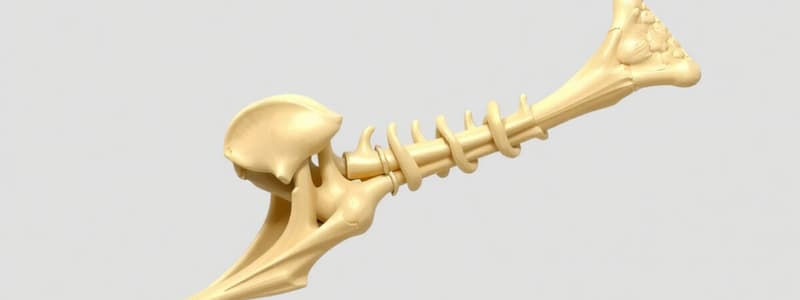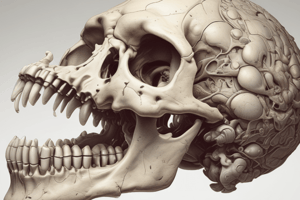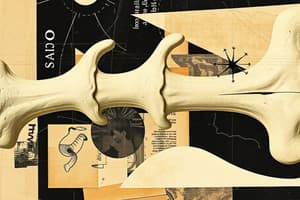Podcast
Questions and Answers
What triggers apoptosis in chondrocytes during endochondral ossification?
What triggers apoptosis in chondrocytes during endochondral ossification?
- Formation of the bone collar (correct)
- Presence of osteoblasts
- Nutrient supply from blood vessels
- Increasing size of chondrocytes
Where do secondary centers of ossification form?
Where do secondary centers of ossification form?
- Along the periosteum before birth
- In the epiphyses after birth (correct)
- Within the medullary cavity after adulthood
- In the diaphysis during infancy
What remains in the locations of growth after bone development?
What remains in the locations of growth after bone development?
- Bone spicules in the diaphysis
- Cartilage in the periosteum
- Medullary cavity with red marrow
- Growth/epiphyseal plates and articular cartilage (correct)
Which cells are responsible for the formation of bone matrix during ossification?
Which cells are responsible for the formation of bone matrix during ossification?
What characterizes periosteal/appositional growth of bone?
What characterizes periosteal/appositional growth of bone?
What is the primary origin of muscle fibers?
What is the primary origin of muscle fibers?
What process begins during Week 5 that is crucial for cartilage formation?
What process begins during Week 5 that is crucial for cartilage formation?
Which cells form as a result of muscle fiber differentiation?
Which cells form as a result of muscle fiber differentiation?
How do myotubes form during muscle development?
How do myotubes form during muscle development?
What do chondroblasts secrete during the process of chondrogenesis?
What do chondroblasts secrete during the process of chondrogenesis?
Which connective tissue surrounds muscle fibers?
Which connective tissue surrounds muscle fibers?
What happens to most muscles by the end of the first year after birth?
What happens to most muscles by the end of the first year after birth?
Which zone is NOT typically associated with endochondral bone growth?
Which zone is NOT typically associated with endochondral bone growth?
What do chondroblasts mature into?
What do chondroblasts mature into?
Which type of bone formation directly develops from mesenchyme?
Which type of bone formation directly develops from mesenchyme?
What is the initial type of bone created during intramembranous ossification?
What is the initial type of bone created during intramembranous ossification?
Which ossification process primarily forms appendicular bones?
Which ossification process primarily forms appendicular bones?
In which developmental week do mesenchymal cells start forming models of hyaline cartilage?
In which developmental week do mesenchymal cells start forming models of hyaline cartilage?
What transforms into osteocytes during the ossification process?
What transforms into osteocytes during the ossification process?
Which structure surrounds the diaphysis during endochondral ossification?
Which structure surrounds the diaphysis during endochondral ossification?
How is hydroxyapatite integrated into the bone during ossification?
How is hydroxyapatite integrated into the bone during ossification?
Which type of mesoderm differentiates to form somites?
Which type of mesoderm differentiates to form somites?
What is the primary role of the sclerotome in somite development?
What is the primary role of the sclerotome in somite development?
During what week of development does the differentiation of somites begin?
During what week of development does the differentiation of somites begin?
Which component of the somite is responsible for forming the dermatome?
Which component of the somite is responsible for forming the dermatome?
What structures do the mesodermal cells from the sclerotome condense to form?
What structures do the mesodermal cells from the sclerotome condense to form?
In which direction do somites form during development?
In which direction do somites form during development?
What is the primary fate of epithelial cells in the myotome?
What is the primary fate of epithelial cells in the myotome?
Which of the following is NOT a component of the somite?
Which of the following is NOT a component of the somite?
What muscles are formed by the epaxial division of myotomes?
What muscles are formed by the epaxial division of myotomes?
Which myotomes are responsible for forming the scalene and infrahyoid muscles?
Which myotomes are responsible for forming the scalene and infrahyoid muscles?
What type of muscles do hypaxial myotomes form?
What type of muscles do hypaxial myotomes form?
Which of the following best describes the relationship between myotomes and spinal nerves?
Which of the following best describes the relationship between myotomes and spinal nerves?
Which muscle is formed by lumbar myotomes?
Which muscle is formed by lumbar myotomes?
What type of muscles do the thoracic myotomes contribute to?
What type of muscles do the thoracic myotomes contribute to?
Which of the following structures do dorsal rami spinal nerves primarily innervate?
Which of the following structures do dorsal rami spinal nerves primarily innervate?
Which statement best describes the segmentation of epaxial muscles?
Which statement best describes the segmentation of epaxial muscles?
What happens to cartilage in individuals with certain diseases affecting cartilage maintenance?
What happens to cartilage in individuals with certain diseases affecting cartilage maintenance?
What type of growth allows bones to increase in diameter?
What type of growth allows bones to increase in diameter?
What is maintained by osteoblasts and osteoclasts in the medullary cavity?
What is maintained by osteoblasts and osteoclasts in the medullary cavity?
Which part of long bones is responsible for continued growth after birth?
Which part of long bones is responsible for continued growth after birth?
What type of growth occurs primarily during lengthening of bones?
What type of growth occurs primarily during lengthening of bones?
What role do osteoprogenitor cells play in bone development?
What role do osteoprogenitor cells play in bone development?
What is one potential symptom of conditions where cartilage is improperly regulated?
What is one potential symptom of conditions where cartilage is improperly regulated?
Which structure covers the long bones and includes the osteoprogenic layer?
Which structure covers the long bones and includes the osteoprogenic layer?
What is the primary role of osteoblasts during the process described?
What is the primary role of osteoblasts during the process described?
How does the appearance of the calcified cartilage compare to hyaline cartilage?
How does the appearance of the calcified cartilage compare to hyaline cartilage?
What structure is observed at the end of the bone in the histological slide?
What structure is observed at the end of the bone in the histological slide?
What differentiates the zone of ossification from the zone of calcified cartilage?
What differentiates the zone of ossification from the zone of calcified cartilage?
Where do the cuboidal bodies of the developing embryo originate from?
Where do the cuboidal bodies of the developing embryo originate from?
Why is it important to observe histology slides early in the study of musculoskeletal embryology?
Why is it important to observe histology slides early in the study of musculoskeletal embryology?
Which cell type would you expect to be present in the zone of ossification?
Which cell type would you expect to be present in the zone of ossification?
What detail is indicated about the lamellae in the histological slide?
What detail is indicated about the lamellae in the histological slide?
What is the primary fate of the myotome in somite differentiation?
What is the primary fate of the myotome in somite differentiation?
Which of the following structures primarily originates from the sclerotome?
Which of the following structures primarily originates from the sclerotome?
What does the term 'dural myotome' imply about somite differentiation?
What does the term 'dural myotome' imply about somite differentiation?
How does the configuration of somites influence body patterns today?
How does the configuration of somites influence body patterns today?
In what manner do the cells originating from the myotome contribute to the body structure?
In what manner do the cells originating from the myotome contribute to the body structure?
What is the significance of the notochord during the development of the somites?
What is the significance of the notochord during the development of the somites?
Which specific type of cells migrate from the sclerotome during somite development?
Which specific type of cells migrate from the sclerotome during somite development?
What does the differentiation of somites contribute to in terms of body organization?
What does the differentiation of somites contribute to in terms of body organization?
What initial step occurs during the healing of a bone after a fracture?
What initial step occurs during the healing of a bone after a fracture?
Which type of joint involves highly fibrous connective tissue?
Which type of joint involves highly fibrous connective tissue?
What is the main purpose of synovial membranes in the joints?
What is the main purpose of synovial membranes in the joints?
What is a common result of a Colles' fracture?
What is a common result of a Colles' fracture?
During the development of cartilage, what type of cartilage predominates?
During the development of cartilage, what type of cartilage predominates?
What can result from the presence of high link cartilage in bones?
What can result from the presence of high link cartilage in bones?
After the initial cleanup of bone fragments, what is the next step in bone healing?
After the initial cleanup of bone fragments, what is the next step in bone healing?
What happens to the solid structure formed in synovial joints during development?
What happens to the solid structure formed in synovial joints during development?
What type of cells are responsible for the development of muscles in limb buds?
What type of cells are responsible for the development of muscles in limb buds?
What is the primary role of the apical ectodermal ridge in limb bud development?
What is the primary role of the apical ectodermal ridge in limb bud development?
In limb bud development, what does the zone of polarizing activity primarily influence?
In limb bud development, what does the zone of polarizing activity primarily influence?
Which of the following correctly describes the axis of limb bud development that differs from standard anatomical positions?
Which of the following correctly describes the axis of limb bud development that differs from standard anatomical positions?
What type of transformation do myogenic precursor cells undergo to become muscle cells?
What type of transformation do myogenic precursor cells undergo to become muscle cells?
Which aspect of limb development influences the medial-lateral differentiation?
Which aspect of limb development influences the medial-lateral differentiation?
What is the primary function of dermal myotome cells in limb bud development?
What is the primary function of dermal myotome cells in limb bud development?
What anatomical reference describes the direction in which limb buds grow from the midline?
What anatomical reference describes the direction in which limb buds grow from the midline?
Flashcards
Intramembranous ossification
Intramembranous ossification
Bone development directly in mesenchyme, forming most axial bones.
Endochondral ossification
Endochondral ossification
Bone development from cartilaginous models, forming most appendicular bones.
Primary ossification center
Primary ossification center
Initial bone formation in the diaphysis, during development.
Secondary ossification center
Secondary ossification center
Signup and view all the flashcards
Epiphyseal plate
Epiphyseal plate
Signup and view all the flashcards
Appositional growth
Appositional growth
Signup and view all the flashcards
Somites
Somites
Signup and view all the flashcards
Sclerotome
Sclerotome
Signup and view all the flashcards
Myotome
Myotome
Signup and view all the flashcards
Dermatome
Dermatome
Signup and view all the flashcards
Epaxial muscles
Epaxial muscles
Signup and view all the flashcards
Hypaxial muscles
Hypaxial muscles
Signup and view all the flashcards
Mesoderm
Mesoderm
Signup and view all the flashcards
Medullary cavity
Medullary cavity
Signup and view all the flashcards
Osteoblasts
Osteoblasts
Signup and view all the flashcards
Osteoclasts
Osteoclasts
Signup and view all the flashcards
Epiphysis
Epiphysis
Signup and view all the flashcards
Bone remodeling
Bone remodeling
Signup and view all the flashcards
Axial Skeleton
Axial Skeleton
Signup and view all the flashcards
Limb buds
Limb buds
Signup and view all the flashcards
Study Notes
Bone Development
- Bone develops in connective tissue (CT) from mesenchyme and cartilage.
- Bone is constantly replaced by osteoblasts and osteoclasts throughout life.
Intramembranous ossification
- Bone develops directly in mesenchyme.
- Mesenchyme is unorganized CT that forms membranous sheaths.
- Forms most axial bones.
Endochondral ossification
- Bone develops from cartilaginous models.
- Forms most appendicular bones.
Endochondral Ossification: Primary Centers
- During week 5 of development, mesenchymal cells form models of hyaline cartilage surrounded by perichondrium.
- Bone collar forms around the diaphysis (shaft) from osteoblasts in the perichondrium.
- Chondrocytes in the diaphysis hypertrophy, cutting off nutrient supply and leading to apoptosis. This creates the marrow cavity.
- Blood vessels penetrate the periosteum and bone collar, bringing osteoprogenitor cells to form primary centers of ossification.
- Osteoprogenitor cells become osteoblasts or hematopoietic cells.
- Osteoblasts deposit bone matrix (osteoid and hydroxyapatite), replacing cartilage.
- Most diaphyses are ossified at birth.
Endochondral Ossification: Secondary Centers
- Form in epiphyses after birth.
- Develop similarly to primary centers; however, trabecular bone replaces medullary cavity.
Bone Growth
- Appositional/Periosteal Growth: Growth in diameter that occurs in compact bone along the diaphyseal shaft.
Somite Differentiation
- Somites develop from the paraxial mesoderm, located adjacent to the notochord.
- Somites form in a cranial to caudal direction.
- Sclerotome forms bone and cartilage.
- Myotome forms skeletal muscle.
- Dermatome forms dermis.
Differentiation of Somites
- Somite differentiation begins during the fourth week of development in the mesoderm of the trilaminar embryo.
- The dermomyotome differentiates into the dermatome (dermis and accessory organs) and myotome (muscle).
- The sclerotome migrates to form bone and connective tissue.
Development of the Trunk
- Mesodermal cells from the sclerotome migrate and condense around the notochord, neural tube, and lateral body wall.
- Condensed cells form the centrum (vertebral body), vertebral arches (future ribs), and costal processes.
Development of Trunk Myotomes
- Myotomes divide and migrate, taking spinal nerve branches with them, establishing a patterned innervation of muscle groups.
- Myotomes form the epaxial (dorsal to vertebral column) and hypaxial (ventral to vertebral column) muscle divisions.
Epaxial Muscle Division
- Form the posterior, segmented muscles of the main body axis.
- Extensor muscles of the neck and vertebral column.
- Examples: Neck and vertebral column extensors.
Hypaxial Muscle Division
- Form the anterior/ventral, segmented muscles of the main body axis.
- Flexor muscles of the neck and vertebral column.
- Examples: Scalene muscles, longus colli and capitis, infrahyoid muscles, geniohyoid (cervical myotomes) and lateral and ventral flexors of the vertebral column (thoracic myotomes).
- Also includes the quadratus lumborum (lumbar myotomes) and the pelvic diaphragm (sacrococcygeal myotomes).
Bone Growth & Ossification
- Epiphyses are the ends of long bones (e.g., humerus, femur) and are initially made of cartilage.
- Secondary ossification centers form after birth to further develop the ends of long bones.
- Bone lengthening occurs at the epiphyseal plate, a cartilaginous growth plate.
- Medullary cavity inside long bones continues to expand through osteoblasts and osteoclasts activity.
- Abnormal cartilage growth can lead to disorders like stiff person syndrome, where cartilage turns to bone.
- Bone growth happens in two ways:
- Interstitial growth (length) occurs at the epiphyseal plate.
- Appositional growth (width) occurs at the outer compact bone layer.
- Periosteum is a connective tissue covering long bones that contains osteoprogenitor cells.
Bone Formation & Development
- Endochondral ossification is the process by which cartilage is replaced by bone.
- Cartilage is calcified and hardened.
- Osteoblasts deposit bone onto the calcified cartilage, replacing it.
- Axial musculoskeletal system develops from mesodermal cells, specifically the sclerotome, which condense at the midline of the embryo.
- Limb buds are the precursors to limbs and contain myogenic precursor cells that differentiate into muscle cells.
- Epithelial mesenchymal transformation is a key process in limb development.
Limb Bud Development
- Proximodistal growth (from midline outwards) is driven by the apical ectodermal ridge.
- Anterior-posterior patterning (thumb to pinky) is influenced by the zone of polarizing activity.
- Lateral-medial patterning (radial/tibial to fibular/ulnar) is also affected by the zone of polarizing activity.
Bone Healing
- Fracture healing involves a series of steps:
- Osteoclasts remove bone fragments.
- Bone formation occurs to replace damaged bone.
Studying That Suits You
Use AI to generate personalized quizzes and flashcards to suit your learning preferences.




